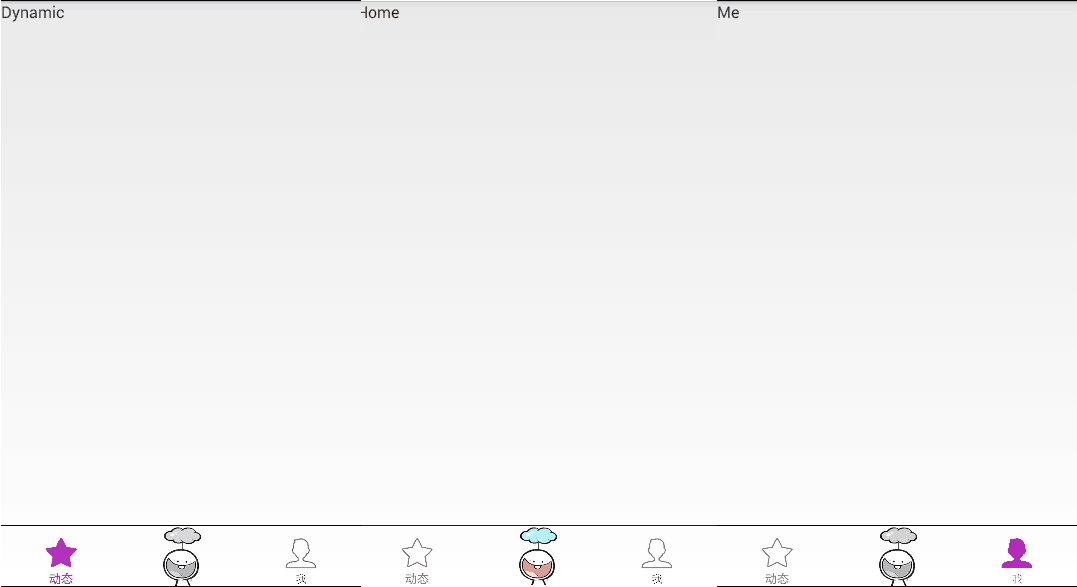- Android安卓Fragment简单实现
- 效果图如下
- 先上种写法都一样的代码
- 接下来就是先写一个比较笨的方法
- 接下来就是先写一个相对比较好的方法
- 最后发一下源码
- 需要注意一下
Android安卓Fragment简单实现
做项目的时候要做底部按钮的实现,用到的是Fragment,尝试了挺久,想到了两种实现。一个是比较笨是写法,一个是比较好的写法。
效果图如下:

先上种写法都一样的代码
因为设置了3个按钮,所以有3个和3个XML,写法差不多,就贴一个就好了。
显示xml中的代码,文件名是:home.xml
<?xml version="1.0" encoding="utf-8"?>
<LinearLayout xmlns:android="http://schemas.android.com/apk/res/android"
android:layout_width="match_parent"
android:layout_height="match_parent"
android:orientation="vertical" >
<TextView
android:layout_width="wrap_content"
android:layout_height="wrap_content"
android:text="@string/home"/>
</LinearLayout>然后是对应的基础了Fragment的代码,文件名是:Home.java
package myandroidapplication.teamofmengmen;
import android.os.Bundle;
import android.support.annotation.Nullable;
import android.support.v4.app.Fragment;
import android.util.Log;
import android.view.LayoutInflater;
import android.view.View;
import android.view.ViewGroup;
public class Home extends Fragment {
private String TAG = "Home";
@Override
public void onCreate(Bundle savedInstanceState) {
Log.i(TAG, "Home" + "onCreate");
super.onCreate(savedInstanceState);
setRetainInstance(true);
}
@Override
public View onCreateView(LayoutInflater inflater,
@Nullable ViewGroup container, @Nullable Bundle savedInstanceState) {
Log.i(TAG, "Home" + "onCreateView");
return inflater.inflate(R.layout.home, container, false);
}
}
项目中有3个按钮,分别是Dynamic、Home、Me。由于基础代码差不多,所以就列了一个。
接下来就是先写一个比较笨的方法
其实都很简单,直接上代码
先上XML中的代码,文件名是:activity_main_old.xml
<?xml version="1.0" encoding="utf-8"?>
<LinearLayout xmlns:android="http://schemas.android.com/apk/res/android"
xmlns:tools="http://schemas.android.com/tools"
android:layout_width="match_parent"
android:layout_height="match_parent"
android:orientation="vertical" >
<!-- 标题栏 -->
<LinearLayout
android:layout_width="match_parent"
android:layout_height="0dp"
android:layout_weight="1" >
<TextView
android:layout_width="match_parent"
android:layout_height="match_parent"
android:text="@string/title_old" />
</LinearLayout>
<!-- 正文 -->
<LinearLayout
android:layout_width="match_parent"
android:layout_height="0dp"
android:layout_weight="12"
android:orientation="vertical" >
<fragment
android:id="@+id/fragment_main_dynamic"
android:name="myandroidapplication.teamofmengmen.Dynamic"
android:layout_width="match_parent"
android:layout_height="match_parent"
tools:layout="@layout/dynamic" />
<fragment
android:id="@+id/fragment_main_home"
android:name="myandroidapplication.teamofmengmen.Home"
android:layout_width="match_parent"
android:layout_height="match_parent"
tools:layout="@layout/home" />
<fragment
android:id="@+id/fragment_main_me"
android:name="myandroidapplication.teamofmengmen.Me"
android:layout_width="match_parent"
android:layout_height="match_parent"
tools:layout="@layout/me" />
</LinearLayout>
<!-- 底部按钮 -->
<LinearLayout
android:id="@+id/ll_main_bottombutton"
android:layout_width="match_parent"
android:layout_height="0dp"
android:layout_weight="1"
android:orientation="vertical" >
<View
android:layout_width="match_parent"
android:layout_height="0.3dp"
android:background="@android:color/background_dark" />
<LinearLayout
android:layout_width="match_parent"
android:layout_height="match_parent"
android:orientation="horizontal" >
<ImageView
android:id="@+id/iv_main_bottombuttom_dynamic"
android:layout_width="0dp"
android:layout_height="match_parent"
android:layout_weight="1"
android:contentDescription="@string/imageview"
android:src="@drawable/main_dynamic" />
<ImageView
android:id="@+id/iv_main_bottombuttom_home"
android:layout_width="0dp"
android:layout_height="match_parent"
android:layout_weight="1"
android:contentDescription="@string/imageview"
android:src="@drawable/main_main" />
<ImageView
android:id="@+id/iv_main_bottombuttom_me"
android:layout_width="0dp"
android:layout_height="match_parent"
android:layout_weight="1"
android:contentDescription="@string/imageview"
android:src="@drawable/main_me" />
</LinearLayout>
</LinearLayout>
</LinearLayout>然后是对应继承了FragmentActivity类的代码,文件名为:MainActivity_Old.java
package myandroidapplication.teamofmengmen;
import android.os.Bundle;
import android.support.v4.app.Fragment;
import android.support.v4.app.FragmentActivity;
import android.support.v4.app.FragmentManager;
import android.support.v4.app.FragmentTransaction;
import android.util.Log;
import android.view.View;
import android.view.Window;
import android.view.View.OnClickListener;
import android.widget.ImageView;
import android.widget.Toast;
public class MainActivity_Old extends FragmentActivity {
private ImageView iv_main_bottombuttom_dynamic, iv_main_bottombuttom_home,
iv_main_bottombuttom_me;
private Fragment f_home, f_me, f_dynamic;
private FragmentTransaction ft_me, ft_home, ft_dynamic;
private FragmentManager fm = getSupportFragmentManager();
private String TAG = "MainActivity_Old";
@Override
protected void onCreate(Bundle savedInstanceState) {
super.onCreate(savedInstanceState);
this.requestWindowFeature(Window.FEATURE_NO_TITLE);
setContentView(R.layout.activity_main_old);
Toast.makeText(getApplicationContext(), TAG, Toast.LENGTH_SHORT).show();
Log.i(TAG, "MainActivity_Old:onCreate");
setViewById();
beginFragmentActivity();
onclick();
}
// 通过Id找到对应的View
private void setViewById() {
iv_main_bottombuttom_dynamic = (ImageView) findViewById(R.id.iv_main_bottombuttom_dynamic);
iv_main_bottombuttom_home = (ImageView) findViewById(R.id.iv_main_bottombuttom_home);
iv_main_bottombuttom_me = (ImageView) findViewById(R.id.iv_main_bottombuttom_me);
f_me = fm.findFragmentById(R.id.fragment_main_me);
f_home = fm.findFragmentById(R.id.fragment_main_home);
f_dynamic = fm.findFragmentById(R.id.fragment_main_dynamic);
}
// 进入界面打开的第一个界面
@SuppressWarnings("deprecation")
private void beginFragmentActivity() {
initFragment();
iv_main_bottombuttom_home.setImageDrawable(getResources().getDrawable(
R.drawable.main_main_s));
ft_dynamic.hide(f_dynamic).commit();
ft_home.show(f_home).commit();
ft_me.hide(f_me).commit();
}
// 点击时加载的各种Fragment
private void onclick() {
iv_main_bottombuttom_dynamic.setOnClickListener(new OnClickListener() {
@SuppressWarnings("deprecation")
@Override
public void onClick(View v) {
initFragment();
iv_main_bottombuttom_dynamic.setImageDrawable(getResources()
.getDrawable(R.drawable.main_dynamic_s));
ft_dynamic.show(f_dynamic).commit();
ft_home.hide(f_home).commit();
ft_me.hide(f_me).commit();
}
});
iv_main_bottombuttom_home.setOnClickListener(new OnClickListener() {
@SuppressWarnings("deprecation")
@Override
public void onClick(View v) {
initFragment();
iv_main_bottombuttom_home.setImageDrawable(getResources()
.getDrawable(R.drawable.main_main_s));
ft_dynamic.hide(f_dynamic).commit();
ft_home.show(f_home).commit();
ft_me.hide(f_me).commit();
}
});
iv_main_bottombuttom_me.setOnClickListener(new OnClickListener() {
@SuppressWarnings("deprecation")
@Override
public void onClick(View v) {
initFragment();
iv_main_bottombuttom_me.setImageDrawable(getResources()
.getDrawable(R.drawable.main_me_s));
ft_dynamic.hide(f_dynamic).commit();
ft_home.hide(f_home).commit();
ft_me.show(f_me).commit();
}
});
}
// 初始化Fragment,每次点击时要进行调用
@SuppressWarnings("deprecation")
private void initFragment() {
ft_me = fm.beginTransaction().hide(f_me);
ft_home = fm.beginTransaction().hide(f_home);
ft_dynamic = fm.beginTransaction().hide(f_dynamic);
iv_main_bottombuttom_dynamic.setImageDrawable(getResources()
.getDrawable(R.drawable.main_dynamic));
iv_main_bottombuttom_home.setImageDrawable(getResources().getDrawable(
R.drawable.main_main));
iv_main_bottombuttom_me.setImageDrawable(getResources().getDrawable(
R.drawable.main_me));
}
}
代码都有注释了,而且很简单,也很好理解把。
接下来就是先写一个相对比较好的方法
为什么说是比较好的呢,因为上面的方法是一Activity就加载了全部Fragment,然而这个新的写法,对内存做了一点点优化,当你没有点击打开新的Fragment时,Fragment不会先加载。
贴上XML中的代码,文件名是:activity_main.xml
<RelativeLayout xmlns:android="http://schemas.android.com/apk/res/android"
xmlns:tools="http://schemas.android.com/tools"
android:layout_width="match_parent"
android:layout_height="match_parent"
android:orientation="vertical"
tools:context="myandroidapplication.teamofmengmen.MainActivity" >
<!-- 底部按钮 -->
<LinearLayout
android:id="@+id/ll_main_bottombutton"
android:layout_width="match_parent"
android:layout_height="54dp"
android:layout_alignParentBottom="true"
android:orientation="vertical" >
<View
android:layout_width="match_parent"
android:layout_height="0.3dp"
android:background="@android:color/background_dark" />
<RadioGroup
android:id="@+id/rg_main_bottombutton"
android:layout_width="match_parent"
android:layout_height="match_parent"
android:orientation="horizontal" >
<RadioButton
android:id="@+id/rb_main_bottombuttom_dynamic"
android:layout_width="0dp"
android:layout_height="match_parent"
android:layout_weight="1"
android:button="@null" />
<RadioButton
android:id="@+id/rb_main_bottombuttom_home"
android:layout_width="0dp"
android:layout_height="match_parent"
android:layout_weight="1"
android:button="@null" />
<RadioButton
android:id="@+id/rb_main_bottombuttom_me"
android:layout_width="0dp"
android:layout_height="match_parent"
android:layout_weight="1"
android:button="@null" />
</RadioGroup>
</LinearLayout>
<!-- 正文和标题,由于是代码的问题,所以被写在XML下面 -->
<LinearLayout
android:layout_width="match_parent"
android:layout_height="match_parent"
android:layout_above="@id/ll_main_bottombutton"
android:orientation="vertical" >
<FrameLayout
android:id="@+id/framelayout_main_titleandtext"
android:layout_width="match_parent"
android:layout_height="0dp"
android:layout_weight="1" />
</LinearLayout>
</RelativeLayout>然后是对应的类,类名为:MainActivity.java
package myandroidapplication.teamofmengmen;
import android.os.Bundle;
import android.support.v4.app.Fragment;
import android.support.v4.app.FragmentActivity;
import android.support.v4.app.FragmentManager;
import android.support.v4.app.FragmentTransaction;
import android.util.Log;
import android.view.Window;
import android.widget.RadioButton;
import android.widget.RadioGroup;
public class MainActivity extends FragmentActivity {
private RadioButton rb_main_bottombuttom_dynamic,
rb_main_bottombuttom_home, rb_main_bottombuttom_me;
private Fragment f_home, f_me, f_dynamic;
private FragmentManager fm = getSupportFragmentManager();
private RadioGroup rg_main_bottombutton;
private String TAG = "MainActivity";
@Override
protected void onCreate(Bundle savedInstanceState) {
super.onCreate(savedInstanceState);
this.requestWindowFeature(Window.FEATURE_NO_TITLE);
setContentView(R.layout.activity_main);
setViewById();
// 对RadioGroup设置监听,点击切换到对应的Fragment
rg_main_bottombutton
.setOnCheckedChangeListener(new RadioGroup.OnCheckedChangeListener() {
@Override
public void onCheckedChanged(RadioGroup group, int checkedId) {
Log.i(TAG, "rg_main_bottombutton" + checkedId);
setBottombuttonSelected(checkedId);
}
});
// 开始打开的第一个页面
setBottombuttonSelected(R.id.rb_main_bottombuttom_home);
}
// 通过Id设置对应的View
private void setViewById() {
rb_main_bottombuttom_dynamic = (RadioButton) findViewById(R.id.rb_main_bottombuttom_dynamic);
rb_main_bottombuttom_home = (RadioButton) findViewById(R.id.rb_main_bottombuttom_home);
rb_main_bottombuttom_me = (RadioButton) findViewById(R.id.rb_main_bottombuttom_me);
rg_main_bottombutton = (RadioGroup) findViewById(R.id.rg_main_bottombutton);
}
@SuppressWarnings("deprecation")
private void setBottombuttonSelected(int checkedId) {
// 创建一个事务
FragmentTransaction transaction = fm.beginTransaction();
// 调用函数进行隐藏
hideFragments(transaction);
// 替换按钮的图片
initFragment();
// 通过点击得到的Id做对应的动作
switch (checkedId) {
case R.id.rb_main_bottombuttom_dynamic:
Log.i(TAG, "Click:rb_main_bottombuttom_dynamic");
if (f_dynamic == null) {
f_dynamic = new Dynamic();
transaction.add(R.id.framelayout_main_titleandtext, f_dynamic);
} else {
transaction.show(f_dynamic);
}
rb_main_bottombuttom_dynamic
.setCompoundDrawablesWithIntrinsicBounds(
null,
getResources().getDrawable(
R.drawable.main_dynamic_s), null, null);
break;
case R.id.rb_main_bottombuttom_home:
Log.i(TAG, "Click:rb_main_bottombuttom_home");
if (f_home == null) {
f_home = new Home();
transaction.add(R.id.framelayout_main_titleandtext, f_home);
} else {
transaction.show(f_home);
}
rb_main_bottombuttom_home.setCompoundDrawablesWithIntrinsicBounds(
null, getResources().getDrawable(R.drawable.main_main_s),
null, null);
break;
case R.id.rb_main_bottombuttom_me:
Log.i(TAG, "Click:rb_main_bottombuttom_me");
if (f_me == null) {
f_me = new Me();
transaction.add(R.id.framelayout_main_titleandtext, f_me);
} else {
transaction.show(f_me);
}
rb_main_bottombuttom_me.setCompoundDrawablesWithIntrinsicBounds(
null, getResources().getDrawable(R.drawable.main_me_s),
null, null);
break;
}
// 最后要提交事物,每个事务只能提交一次
transaction.commit();
}
// 隐藏所有的Fragment
private void hideFragments(FragmentTransaction transaction) {
if (f_dynamic != null) {
transaction.hide(f_dynamic);
}
if (f_home != null) {
transaction.hide(f_home);
}
if (f_me != null) {
transaction.hide(f_me);
}
}
// 初始化按钮的图片显示
@SuppressWarnings("deprecation")
private void initFragment() {
rb_main_bottombuttom_dynamic.setCompoundDrawablesWithIntrinsicBounds(
null, getResources().getDrawable(R.drawable.main_dynamic),
null, null);
rb_main_bottombuttom_home.setCompoundDrawablesWithIntrinsicBounds(null,
getResources().getDrawable(R.drawable.main_main), null, null);
rb_main_bottombuttom_me.setCompoundDrawablesWithIntrinsicBounds(null,
getResources().getDrawable(R.drawable.main_me), null, null);
}
}
最后发一下源码
点击下载源码
需要注意一下:
要查看两种方式的实现效果需要看下AndroidManifest.xml这个文件中的这段代码:
<!-- 旧的Fragment实现方法,开始项目时调用 ,去掉注释可以使用 -->
<!--
<activity
android:name=".MainActivity_Old"
android:label="@string/app_name" >
<intent-filter>
<action android:name="android.intent.action.MAIN" />
<category android:name="android.intent.category.LAUNCHER" />
</intent-filter>
</activity>
-->
<!-- 新的Fragment实现方法,开始项目时调用 -->
<activity
android:name=".MainActivity"
android:label="@string/app_name" >
<intent-filter>
<action android:name="android.intent.action.MAIN" />
<category android:name="android.intent.category.LAUNCHER" />
</intent-filter>
</activity>修改此代码可以看到两种不同写法的实现效果。
这篇博客到此接受,感谢阅读。有哪里写不好的地方希望大家指出。
最后
以上就是懵懂航空最近收集整理的关于Android安卓Fragment简单实现Android安卓Fragment简单实现的全部内容,更多相关Android安卓Fragment简单实现Android安卓Fragment简单实现内容请搜索靠谱客的其他文章。








发表评论 取消回复